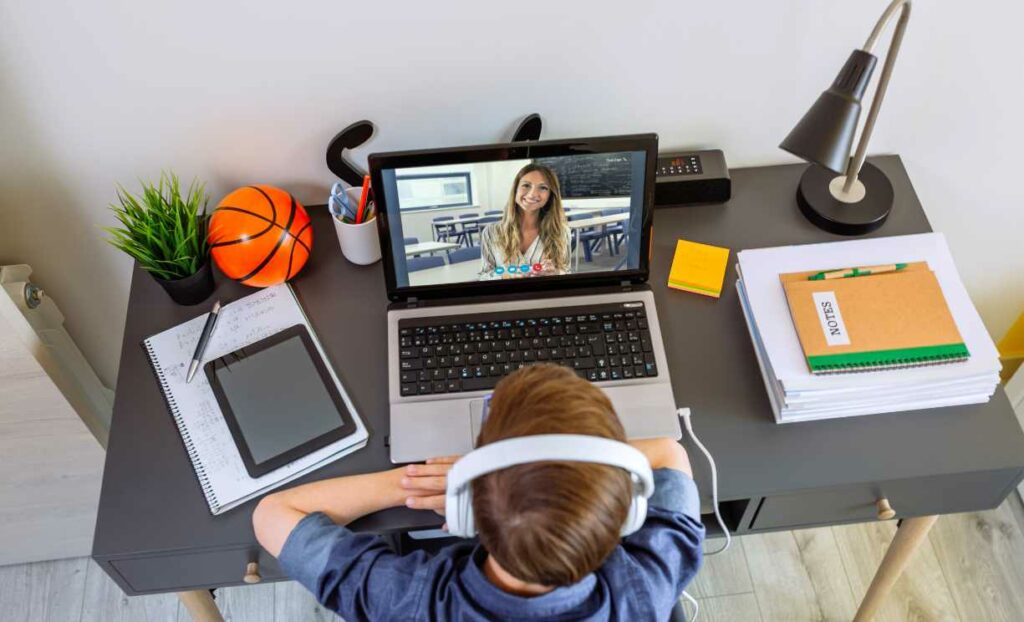In a rapidly evolving digital age, technology has revolutionized various aspects of our lives, including the way we approach mental health care for children. Online therapy for kids has emerged as a transformative and accessible solution for parents seeking support for their children’s emotional well-being. In this blog, we will explore the benefits and considerations of online therapy for kids, shedding light on the potential it holds for fostering healthy mental development.
Contents
Role Of Therapy For Kids
The benefits of therapy for kids extend far beyond immediate problem-solving, contributing to their overall well-being and shaping a foundation for a healthy future. In this blog, we’ll explore the myriad advantages that therapy brings to the lives of children.
- Improved Academic Performance: A child’s emotional state can significantly impact their academic performance. Therapy addresses academic stressors, enhances focus, and instills a positive attitude toward learning. As a result, kids often experience improved concentration, better problem-solving skills, and increased academic achievement.
- Enhanced Social Skills: Social interactions can be challenging for children, and therapy serves as a safe space to develop and refine social skills. Therapists employ various techniques, including role-playing and social scenarios, to help kids navigate friendships, resolve conflicts, and build meaningful connections with peers.
- Coping Mechanisms for Life’s Challenges: Life is replete with challenges, and therapy provides children with valuable coping mechanisms. Whether facing transitions, loss, or adversity, therapy empowers kids to confront challenges with resilience, adaptability, and a positive mindset.
- Increased Self-Esteem and Confidence: Therapy nurtures a positive self-image by validating children’s experiences and achievements. Through praise, encouragement, and goal-setting, therapists help build self-esteem and confidence, enabling kids to face challenges with a belief in their abilities.
- Parent-Child Communication: Family dynamics play a crucial role in a child’s development. Therapy facilitates open communication between parents and children, fostering understanding and empathy. This improved communication strengthens the parent-child bond and creates a supportive environment for the child’s emotional growth.
- Establishing Healthy Habits: Therapy instills healthy habits and coping mechanisms that can last a lifetime. By equipping children with effective tools for managing stress, communicating their needs, and solving problems, therapy sets the stage for a future of emotional resilience and well-being.
Benefits Of Online Kids Therapy
Here are numerous advantages that make online therapy for kids a valuable resource for supporting their emotional well-being.
- Accessibility and Convenience: Online therapy breaks down geographical barriers, providing children with access to mental health support from the comfort of their own homes. This accessibility is particularly beneficial for families in remote areas or those facing logistical challenges, ensuring that every child has the opportunity to receive timely and convenient care.
- Comfort and Familiarity: Children often feel more at ease in familiar environments. Online therapy allows kids to engage with therapists from the safety and comfort of their homes. This sense of familiarity can enhance the therapeutic experience, enabling children to express themselves more openly and authentically.
- Engaging Technology: Therapists leverage interactive tools and engaging technologies to connect with children in virtual sessions. Incorporating games, videos, and other multimedia elements can make the therapy process more enjoyable and effective for young clients, keeping them actively engaged in the therapeutic process.
- Increased Comfort for Shy or Anxious Children: Shy or anxious children may find it challenging to open up in traditional face-to-face settings. Online therapy provides a level of anonymity that can make these children feel more comfortable expressing themselves. This increased comfort can lead to more honest and productive therapeutic discussions.
- Parental Involvement and Observation: Online therapy often allows parents to be more directly involved in the therapeutic process. Parents can observe sessions, actively participate when appropriate, and gain insights into the strategies and techniques used by the therapist. This involvement strengthens the overall support system for the child.
- Adaptability to Various Learning Styles: Children have diverse learning styles, and online therapy allows therapists to adapt their approaches accordingly. Visual aids, interactive exercises, and other online resources can be customized to suit each child’s unique learning preferences, enhancing the therapeutic experience.
Considerations For Online Therapy For Kids
While the convenience and accessibility of virtual therapy are undeniable, it’s crucial for parents to carefully consider certain factors to ensure a safe and effective therapeutic experience for their kids. Here are some essential considerations when opting for online therapy for children.
- Internet Safety and Privacy: One of the primary considerations for online therapy is ensuring a secure and private digital environment. Parents should choose reputable platforms with robust security measures to protect their child’s sensitive information. Verifying the therapist’s credentials and the platform’s commitment to confidentiality is essential.
- Age-Appropriate Platforms and Therapists: Not all online therapy platforms cater to children, and therapists may have varying degrees of experience with younger clients. It’s crucial to select age-appropriate platforms that specialize in providing therapy for kids. Additionally, ensure that the therapist has expertise in working with children for a positive therapeutic relationship.
- Technology Requirements and Accessibility: Before engaging in online therapy, parents should ensure that they have the necessary technology and a reliable internet connection. Familiarizing both the child and the parent with the platform’s features and functionality is key to a seamless experience. Ensuring accessibility for children with special needs is also an important consideration.
- Therapeutic Modalities Tailored to Children: Children may respond differently to therapeutic approaches than adults. It’s important to choose online therapy platforms that offer a variety of therapeutic modalities tailored to the unique needs of children. This might include play therapy, art therapy, or interactive exercises designed to engage and resonate with younger clients.
- Establishing Boundaries and Consistency: Clearly defining boundaries for online therapy sessions is crucial. Establishing a dedicated and quiet space for sessions, free from distractions, helps create a focused and comfortable environment. Consistency in scheduling and participation enhances the child’s sense of security and routine.
Choosing The Right Online Kids Therapist
Selecting the right therapist for your child is a crucial step in fostering their emotional well-being.
- Credentials and Licensing: Verify the therapist’s credentials and licensing. A reputable online therapist for kids should hold relevant qualifications and be licensed to practice. Check for certifications from reputable organizations and ensure they adhere to ethical guidelines and standards.
- Experience with Online Therapy: While experience in child psychology is crucial, experience with online therapy is an added advantage. Therapists who are familiar with the dynamics of virtual sessions can navigate the unique challenges and opportunities presented by the online platform more effectively.
- Child-Friendly Therapeutic Approaches: Look for therapists who employ child-friendly therapeutic approaches. Play therapy, art therapy, and other interactive techniques are often effective with children. The therapist should be skilled in adapting these methods to an online format, ensuring engagement and positive outcomes.
- Technology Platform and Security Measures: Consider the technology platform used for online therapy and the security measures in place. Ensure that the platform complies with privacy regulations, employs encryption, and prioritizes the confidentiality of your child’s information.
- Client Reviews and Testimonials: Seek out client reviews and testimonials to gain insights into the therapist’s effectiveness and the experiences of other parents and children. A therapist with positive feedback and success stories is more likely to provide a valuable therapeutic experience for your child.
- Compatibility and Rapport: Schedule an initial consultation or interview with the therapist to assess compatibility and rapport. A positive and trusting relationship between the child and therapist is essential for the success of therapy. Pay attention to how the therapist engages with your child and addresses their needs.
Conclusion
In conclusion, online therapy for kids offers accessible and personalized support, breaking down geographical barriers and providing comfort in familiar environments. The engaging technology, adaptability to learning styles, and active parental involvement make it a valuable resource. With its convenience and cost-effectiveness, online therapy is shaping the future of children’s mental health care, ensuring that every child has the opportunity for a positive and supportive therapeutic experience.
If you are looking for affordable Online Therapy TherapyMantra can help: Book a trial Online therapy session





